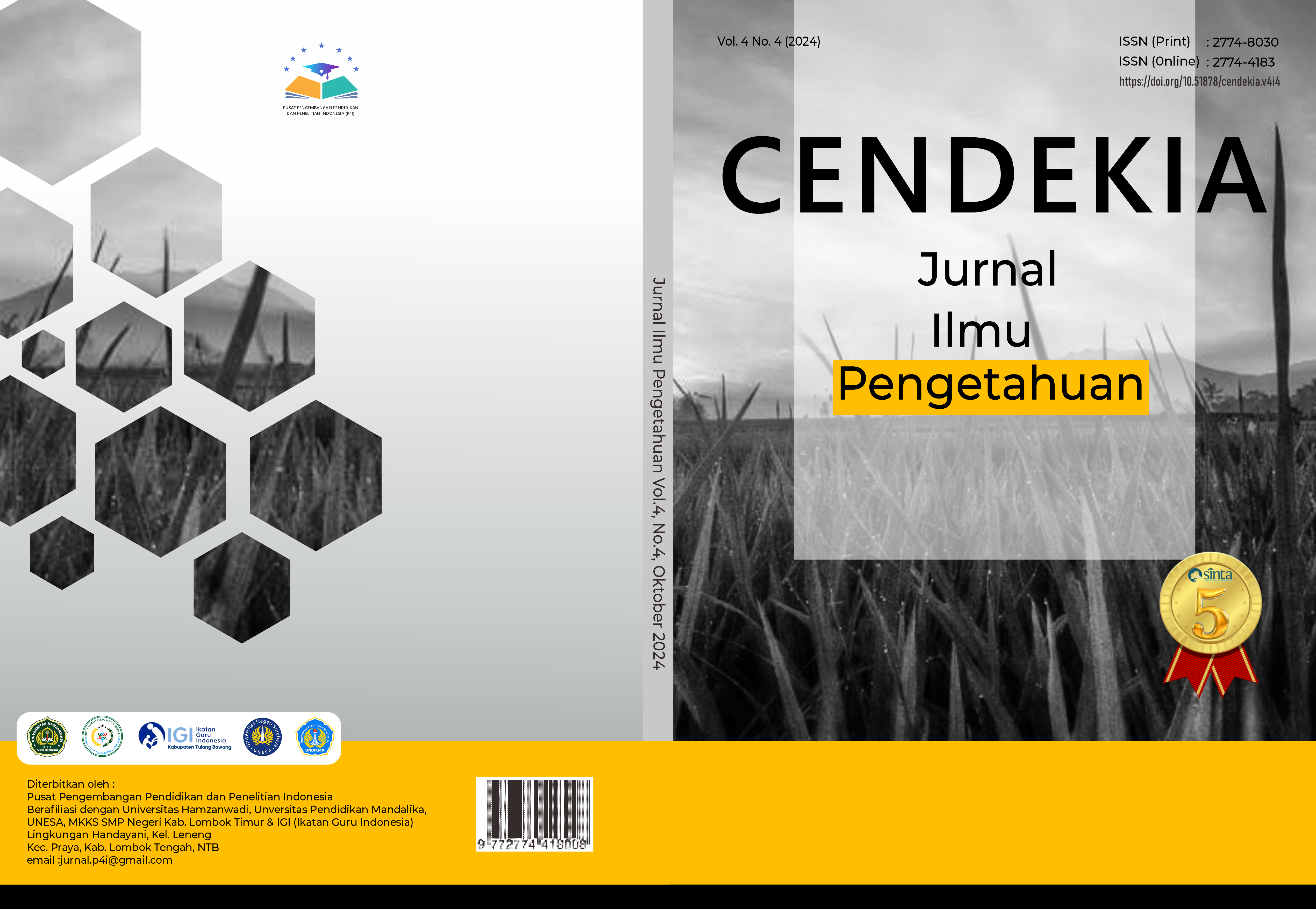PERAN FILSAFAT ILMU DALAM MENGEMBANGKAN METODE PENELITIAN ILMIAH
DOI:
https://doi.org/10.51878/cendekia.v4i4.3821Keywords:
Filsafat ilmu, metode penelitian ilmiah, paradigma penelitianAbstract
Philosophy of science has a crucial role in building a framework of thinking that underlies the development of scientific research methods. This article aims to examine this role by highlighting three main aspects of the philosophy of science, namely ontology, epistemology and axiology, as a basis for the research process. This research uses a qualitative approach with a literature study method, analyzing relevant literature and philosophical theories of science. The study stages include explaining the relationship between philosophy of science and scientific methods, critical evaluation of the contribution of philosophy of science in validating and developing research methods, as well as examining the strengthening of philosophy in contemporary research practice. The results of the discussion show that the philosophy of science helps researchers clarify basic research concepts, determine appropriate paradigms, and ensure coherence between research objectives and the methods used. In addition, the philosophy of science encourages critical reflection on the basic assumptions of research so as to produce methods that are more relevant and adaptive to changes in the scientific context. The main conclusion of this article is that philosophy of science serves not only as a theoretical framework, but also as a practical tool in making methodological decisions, ultimately improving the quality and integrity of scientific research. This article is relevant for academics, researchers and practitioners who wish to deepen their understanding of the relationship between philosophy of science and research methods.
ABSTRAK
Filsafat ilmu memiliki peran krusial dalam membangun kerangka berpikir yang mendasari pengembangan metode penelitian ilmiah. Artikel ini bertujuan untuk mengkaji peran tersebut dengan menyoroti tiga aspek utama filsafat ilmu, yaitu ontologi, epistemologi, dan aksiologi, sebagai landasan dalam proses penelitian. Penelitian ini menggunakan pendekatan kualitatif dengan metode studi pustaka, menganalisis literatur dan teori-teori filsafat ilmu yang relevan. Tahapan kajian meliputi identifikasi hubungan antara filsafat ilmu dan metode ilmiah, evaluasi kritis terhadap kontribusi filsafat ilmu dalam validasi dan pengembangan metode penelitian, serta penelaahan terhadap implikasi filosofis pada praktik penelitian kontemporer. Hasil kajian menunjukkan bahwa filsafat ilmu membantu peneliti dalam memperjelas konsep dasar penelitian, menentukan paradigma yang sesuai, dan memastikan koherensi antara tujuan penelitian dengan metode yang digunakan. Selain itu, filsafat ilmu mendorong refleksi kritis terhadap asumsi-asumsi dasar penelitian sehingga menghasilkan metode yang lebih relevan dan adaptif terhadap perubahan konteks ilmiah. Simpulan utama dari artikel ini adalah bahwa filsafat ilmu tidak hanya berperan sebagai kerangka teoritis, tetapi juga sebagai alat praktis dalam pengambilan keputusan metodologis, yang pada akhirnya meningkatkan kualitas dan integritas penelitian ilmiah. Artikel ini relevan bagi akademisi, peneliti, dan praktisi yang ingin memperdalam pemahaman tentang hubungan antara filsafat ilmu dan metode penelitian.
Downloads
References
Achmad, F. (2018). Filsafat ilmu. Posbakum Antara Teori Dan Praktek, 103–118.
Crotty, M. (2018). The Foundations of Social Research: Meaning and Perspective in the Research Process. London: SAGE Publications.
Fadli, M. R. (2021). Hubungan filsafat dengan ilmu pengetahuan dan relevansinya di era revolusi industri 4.0 (Society 5.0). Jurnal Filsafat, 31(1), 130. https://doi.org/10.22146/jf.42521
Farin, S. E. (2022). Peranan filsafat bagi perkembangan ilmu pengetahuan dan keterampilan ilmu sosial. Tugas Mata Kuliah Mahasiswa, 309–318. Retrieved from http://publikasipips.ulm.ac.id/index.php/tmkm/article/view/177
Frodeman, R. (2017). Sustainable Knowledge: A Theory of Interdisciplinarity. New York: Palgrave Macmillan.
Guba, E. G., & Lincoln, Y. S. (2016). Paradigmatic Controversies, Contradictions, and Emerging Confluences. In N. K. Denzin & Y. S. Lincoln (Eds.), The SAGE Handbook of Qualitative Research (4th ed., pp. 97–128). Thousand Oaks: SAGE Publications.
Habibah, S. (2018). Implikasi filsafat ilmu terhadap perkembangan ilmu pengetahuan dan teknologi. DAR EL-ILMI: Jurnal Studi Keagamaan, Pendidikan Dan Humaniora, 4(1), 166–180.
Hamidah, T., Putri, O. F., Kurniawan, T., Puspitasari, E. I., Khotimah, K., & Suryawati, C. T. (2022). Problematika bimbingan dan konseling bidang karir siswa SMK: A systematic literature review (SLR). TERAPUTIK: Jurnal Bimbingan Dan Konseling, 5(3), 294–304. https://doi.org/10.26539/teraputik.53852
Istikhomah, R. I. A. W. (2021). Filsafat sebagai landasan ilmu dalam pengembangan sains. Jurnal Filsafat Indonesia, 4(1), 59–64.
Marzuki, I., Johra, Arwansyah, Asrudin, Zaenal, Harimuswarah, M. R., Syahrir, M., Ramli, M., & Hadi, A. (2021). Filsafat ilmu di era milenial.
Mertens, D. M. (2015). Research and Evaluation in Education and Psychology: Integrating Diversity with Quantitative, Qualitative, and Mixed Methods (4th ed.). Thousand Oaks: SAGE Publications.
Misra, R. (2016). Ethics in Social Research: Reflections and Challenges. International Journal of Social Research Ethics, 12(3), 185–199. https://doi.org/10.1177/1234567890123456
Muktapa, M. I. (2021). Implikasi filsafat ilmu dan etika keilmuan dalam pengembangan ilmu pengetahuan modern. Jurnal BELAINDIKA (Pembelajaran Dan Inovasi Pendidikan), 3(2), 20–29. https://doi.org/10.52005/belaindika.v3i2.73
Novotny, H., & Bauman, Z. (2018). Re-Thinking Science: Knowledge and the Public in an Age of Uncertainty. Cambridge: Polity Press.
Nurhayati, Syukri, A., & Badarussyamsi. (2021). Filsafat ilmu: Peranan filsafat ilmu untuk kemajuan perkembangan ilmu pengetahuan. TASAMUH: Jurnal Studi Islam, 13(2), 345–358. https://doi.org/10.47945/tasamuh.v13i2.409


















